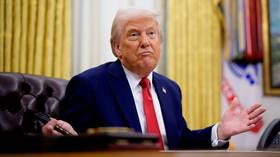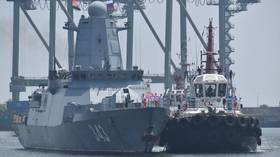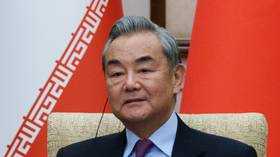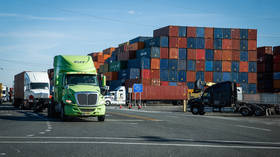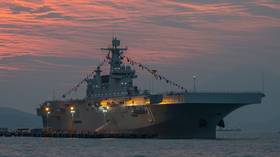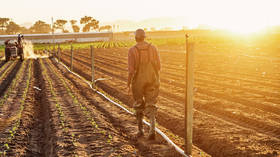70th UN Annual Debate set to kick off amid calls for UNSC reform, looming Putin-Obama tête-à-tête
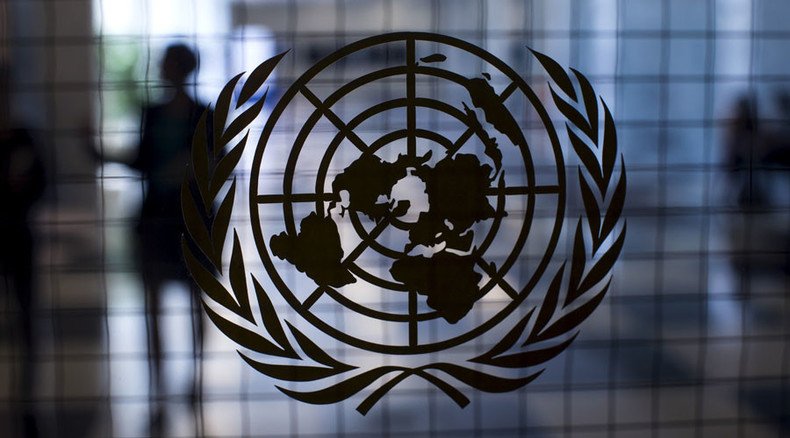
World leaders are flocking to New York for the 70th session of the UN General Assembly for a debate on the most pressing issues of the day. Russian President Vladimir Putin is going to address the gathering for first time since 2005.
Though the UN General Assembly (UNGA) kicked off on September 15, the annual gathering’s key events are still ahead. After the UN’s three-day Sustainable Development Summit, the highly anticipated Annual Debate will take place Monday – and this year it is expected to draw more world leaders than ever before.
Abiding by tradition, Brazil will launch the debate’s crowded agenda on Sunday. President Dilma Rouseff will be followed by the host country, with President Barack Obama addressing the highest ranking representatives of the international community.
#UNGA 2015 Begins https://t.co/WrSinVj0tB День 1 / Day 1 #UN70#70летООНpic.twitter.com/z8qsKpdvYS
— MFA Russia (@mfa_russia) September 27, 2015Vladimir Putin will be addressing the UNGA meeting on Monday for the first time in 10 years. According to Kremlin spokesman Dmitry Peskov, the Russian president has been preparing for his speech for about a month. Foreign Minister Sergey Lavrov, who will head the Russian delegation at the UNGA after Putin’s one-day visit, has said earlier that the president will highlight the Syrian and Ukrainian crises, sanctions, and the fragmentation of global economy, among other pressing issues.
More intriguing may be the scheduled meeting between Putin and US President Barack Obama. The last time Obama and Putin’s sat down for tête-à-tête talks was in June 2013 at the G8 summit in Northern Ireland, while a fleeting meeting took place on the sidelines of an APEC Asia-Pacific summit in Beijing in November 2014. Among the bones of contention between the two world powers are the sanctions the US has imposed on Russia over the Ukrainian crisis.
Putin to meet Obama at UN General Assembly in New York - Kremlin http://t.co/SLu9NvwTVypic.twitter.com/uZeVU4IgWr
— RT America (@RT_America) September 25, 2015White House press secretary Josh Earnest said that Ukraine will be the “top agenda item,” while Peskov said the “mutually agreed upon” one-hour meeting will center around the Syrian crisis.
The media has been speculating about the timing and meaning of the talks. The Wall Street journal wrote that Russia will return to center stage after the meeting.
“Putin wants to leave New York not as a regional power, but as a big player in the world,” said a European official who deals frequently with the Kremlin.
The Los Angeles Times wrote that, with the Putin-Obama meeting scheduled on the sidelines, the UNGA “will be less of a party.”
G4 calls for UN Security Council reform
UNGA members are also set to discuss the 193-member organization’s internal problems. On Saturday, German Chancellor Angela Merkel called for reform of the UN Security Council (UNSC), an issue which has been debated for decades.
“We need a new method of work to solve problems,” she said on the sidelines of the session in New York. “That makes reform of the Security Council necessary, reform which reflects the real power in the world better than the situation today.”
A historic G4 Summit after a decade. We had comprehensive deliberations on reforms of the UNSC. Sharing my remarks. http://t.co/IuTjeNPZWT
— Narendra Modi (@narendramodi) September 26, 2015Earlier on Saturday, G4 leaders from Brazil, Germany, India, and Japan issued a joint statement saying that they will insist on reforming the UNSC at the 70th UNGA session in a bid to receive permanent membership.
READ MORE: Russia to support UNSC reform if backed by over 2/3 of member states – Foreign Ministry
At the moment, the council has 15 members, of which 10 temporary members are elected for two-year terms by the UNGA and five – China, France, Russia, the UK and the US, who were key allies during WWII – have veto powers. The UNSC is a powerful body that has the right to authorize military action and approve sanctions.
“The current atmosphere is that, not only we four, but many others don't agree with the structure and the working method of the Security Council,” Merkel said. “We want to take others with us to reach a modern working structure of the Security Council which suits the 21st century.”
“We have to proceed very wisely,” she added. “We have to find allies to reach our goal of reform.”
Chancellor Merkel arrives on the scene for the opening of the #UNGA#SustainableDevelopment Summit pic.twitter.com/4D6ixU0nHo
— German Mission to UN (@GermanyUN) September 25, 2015
Ukrainian President Petro Poroshenko, who will address the UN’s Sustainable Development Summit on Sunday and then take part in the Annual General Debate, said that reforming UNSC member’s veto powers is one of the major goals of his visit. He said Kiev’s initiative is supported by many other countries. The leader also expressed hope that Ukraine will become a temporary member of the Security Council for 2016-17 after the general vote in October.
Russia’s Security Council envoy Vitaly Churkin views the two proposals – admission of new permanent members and limiting veto powers – as two totally different initiatives.
“We want a historic compromise to be reached between the two main camps: Those who want to have new permanent members and those who don’t want to have permanent members, and advocate a reform with a new category of intermediate countries which will be elected for a longer period of time than the current two years for the current non-permanent members,” Churkin said on Saturday, adding that, so far, this compromise isn’t “anywhere near.”
He also harshly criticized the initiative to limit veto powers, calling the suggestion “populist” and “not a workable scheme.”
‘US has been veto champion in UN for decades’ – #Chomsky to RT http://t.co/gJJVvaP4YMpic.twitter.com/Fd2yeoQsnO
— RT (@RT_com) September 26, 2015“The problem is not only the situation you are dealing with but what kind of proposal you are making to deal with the situation,” Churkin said. “What is the content of the resolution which is going to be put on the table and which a permanent member will not have a right to veto?”
LISTEN MORE:
READ MORE: UN Security Council would lose relevance without Russia’s veto – Churkin
The UNGA, which will end on October 3, will be a diplomatic celebration of the body’s 70th anniversary. About 150 leaders are expected to participate in what seems by far the largest gathering of policymakers in years to outline international goals for the next 15 years.





